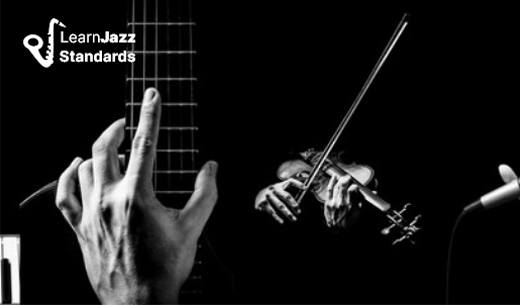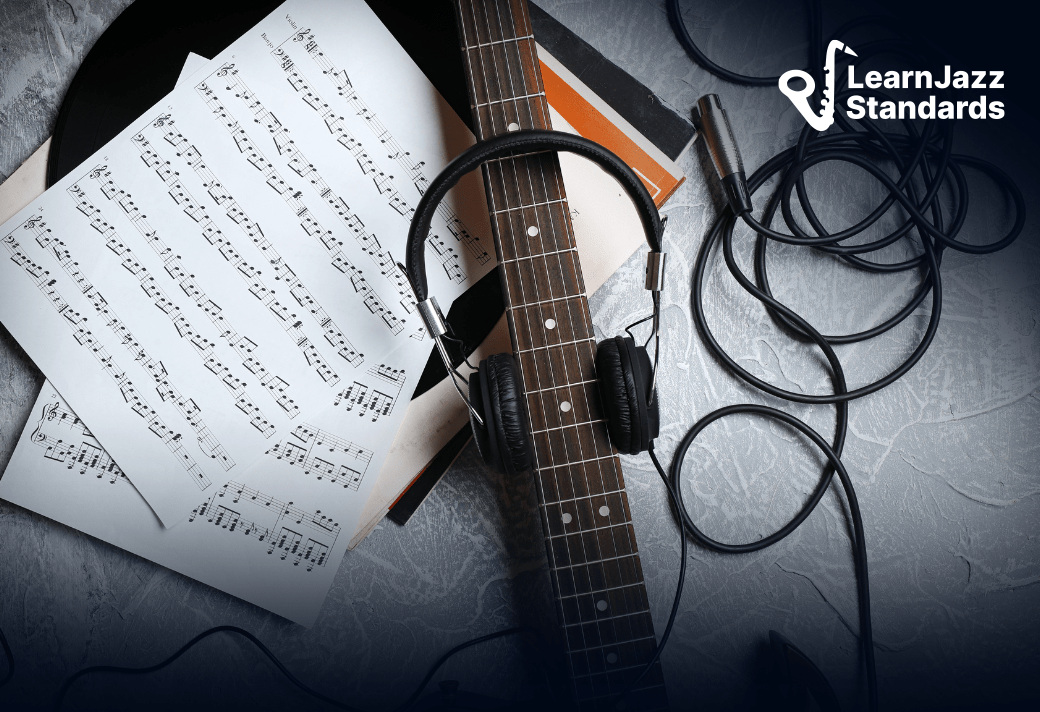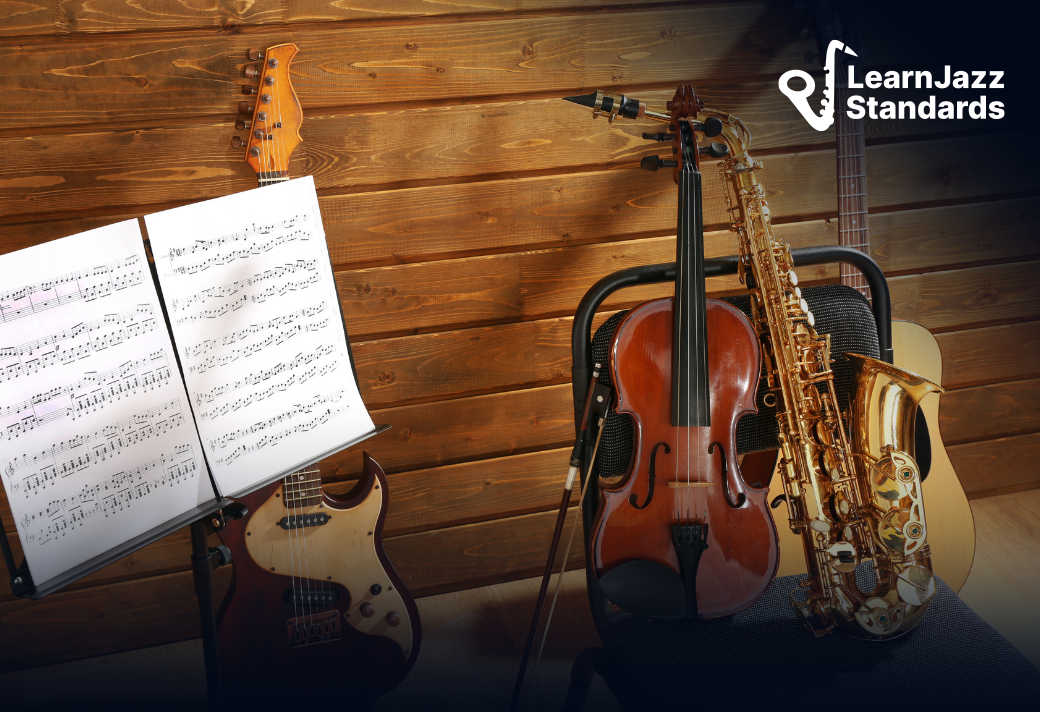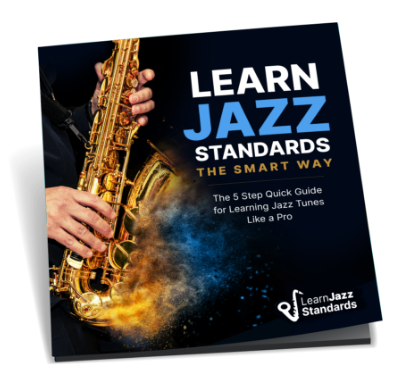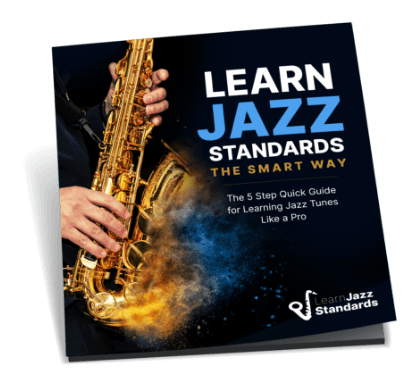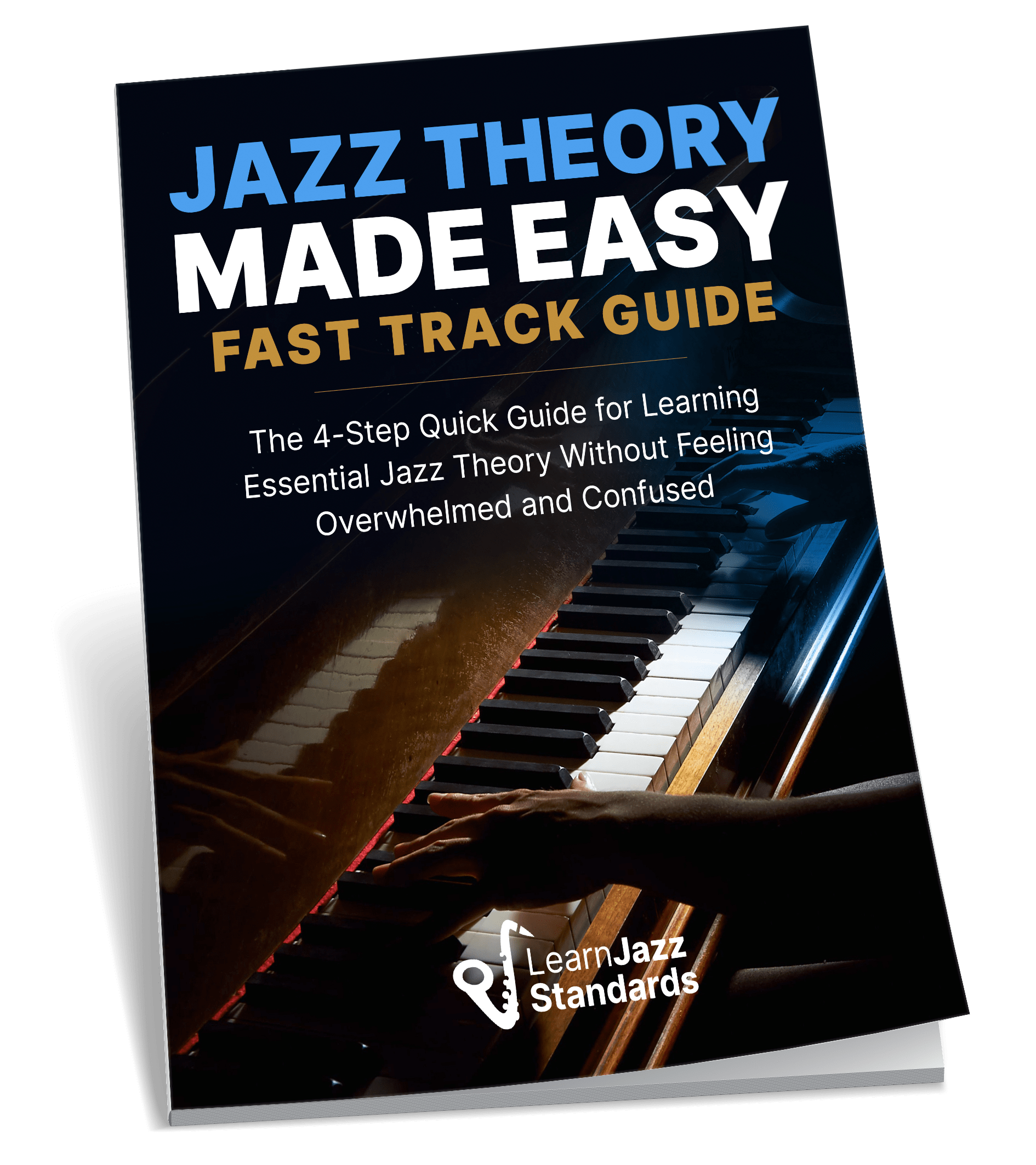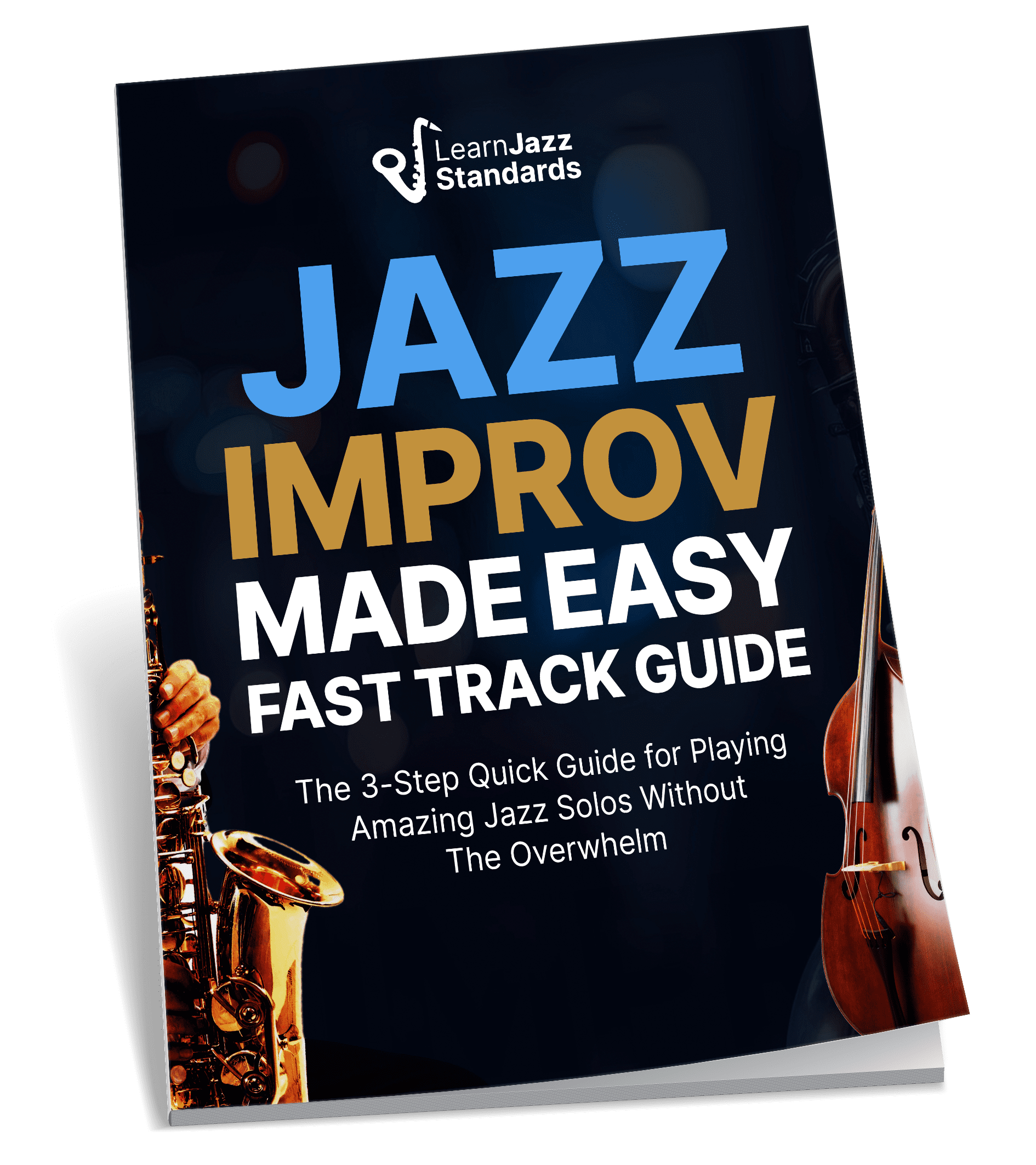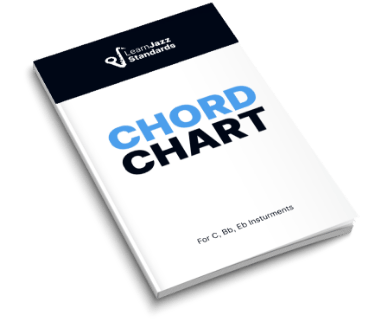Welcome to episode 85 of the LJS Podcast where today we have special guest Steve Nixon from freejazzlessons.com on the show to talk all about how to practice smart and improve quickly. When it comes to becoming a better jazz musician it’s all about practicing, and Steve knows more than a thing or two about this. Listen in!
Listen to episode 85
In today’s episode, we have special guest Steve Nixon on the show. Steve and I had a great talk together about practicing. But not just any kind of practicing: smart practicing. Because when it comes down to it, you can waste hours and hours of your time and cheat yourself of the results you deserve.
Who’s Steve Nixon? Steve Nixon is teaching the world his passion- jazz piano, from touring 17 countries as a musician to reaching over 120 countries with his online video lessons. Steve is the proud owner of freejazzlessons.com. He is also a world touring jazz and blues keyboard player and educator. His performance credits include Grammy Winners Buddy Guy, Koko Taylor, Jaimoe Johanson (from the Allman Brothers) and many other fantastic musicians.
We all want to improve quickly. No one wants to wait ten or twenty years down the road to reach some of their musical goals. So how do we get there faster? You have to practice smart and practice the right things.
Steve unleashes a gold-mine of information in this episode, such as:
-
How to set your practice sessions for success.
-
How to ration your practice time.
-
The top 3 things jazz musicians should be practicing.
-
The importance of learning jazz standards.
-
The importance of rhythm and time feel.
-
The importance of ear training.
-
How long should you practice?
-
What if you don’t have a lot of time to practice?
Important Links:
LJS Inner Circle Membership
Free Guide to learn standards by ear: Learn Jazz Standards the Smart Way
Steve also talks about his new jazz improvisation course called the Jazz Improvisation Super System. It’s an awesome program with hours of video lessons featuring legendary pianist David Garfield. Definitely, check it out![vc_tta_accordion active_section=”1″ title=”Read the Transcript”][vc_tta_section title=”Episode 85″ tab_id=”1508776309307-79d74a87-0549″]Brent: [00:00:22] All right what’s up everybody. My name is Brent. I am the jazz musician behind the website Learn Jazz Standards.com which is a blog and a podcast all geared towards helping you become a better jazz musician. I’m so excited you’re here and just to hang out with me and listen today’s show and welcome if this is your first time ever listening and as always if you’re a regular listener, thank you so much for being here. Now if you’ve been listening to this show for a while you know that I love to have special guests on and earlier this month we had on the show Christopher Sutton from Musical U and he talked to us all about setting goals for your musicianship and today’s special guests really ties in really great with our special guests and the talks that we’re having because today is all about how to practice smart and improve more quickly and that guest that we’re having on today is Steve Nixon from Free Jazz Lessons. He’s the proud owner of Free Jazz Lessons.com. He’s also a world touring jazz and blues keyboard player and educator. His performance credits include Grammy winners Buddy Guy, Koko Taylor among many others. He’s really a fantastic musician. Now Free Jazz Lessons.com is a place for students from all over the world and get access to world class jazz education from the comfort of their own homes. Steve is really a brother in the the online jazz education realm and so we really got along super well so so excited to talk with him all about practicing because he really knows a lot about practicing. [1:33.9]
[00:01:56] He has spent many hours in the practice room. He knows what he’s talking about. This is going to be totally worth your time. He’s also going to be talking about his brand new jazz improvisation course at the very end so be sure to stay tuned for that.Now without further adieu let’s jump in to today’s show. [17.8]
Brent: [00:02:22] All right welcoming on the show today is jazz pianist and he’s the proud owner of free jazz lessons dot.com. I’ve got Steve Nixon on the show Steve Nixon. Thank you so much for being here today. [10.2]
Steve: [00:02:33] It is truly a pleasure. Thanks for having me. [2.0]
Brent: [00:02:36] Awesome. So now a lot of people my audience may not know who you are. I’m sure some do because I know we definitely have a little bit of a crossover audience from learned jazz standards.com and free jazz lessons.com but for those who don’t know who you are I’d love for you to give me just the two minute Steve Nixon bio like what you’re doing right now and what you’re all about. [18.0]
Steve: [00:02:55] Absolutely yes. So I’ve been a professional musician for over 15 years now and for a long time I toured and I taught out of hotel rooms on Skype and played with many of my heroes in the blues and jazz realm. And in 2011 I got a little tired of touring and wanted to dial back a little bit. And so I started Free Jazz lessons more for fun maybe a couple of my students in Chicago would enjoy some of the licks and chords I was putting online. I can’t say that I thought it was going to be one of the biggest if not the biggest jazz piano education website in the world six years later. But here we are today and I am also the proud owner of free jazz lessons.com which is a jazz piano education resource for people all over the world. [45.8]
Brent: [00:03:42] A Congratulations on that Steve, like seriously man I love what you’re doing. I’ve definitely been following what you’re doing what you’re all about. And you know you and me are both all about just you know blessing the world with jazz education to teach people about music and the power that brings. I really appreciate you and everything you’re doing. Now today, I’m really excited because we’re going to talk about practicing, today weren’t talk about practicing smart how to get big results from our practice sessions. [24.9]
[00:04:07] And as you and I both know when it comes to improving as a musician or anything in life right, It’s all about practicing. It’s all about practice not just practicing it’s about practicing the right way and so I’m excited to talk to you about that because I know that you just have a ton of value, ton of knowledge to unload on my audience today and for me personally too. So super excited. But before we do the tips tell me a little bit like about your musical journey you like where you started with your music and how you got to the level of a player you’re at now. [30.1]
Steve: [00:04:38] Yeah that’s a good question. So I played piano and I was always interested in music when I was a kid. I’m going to be honest with you right now, nobody’s listening this interview right now right? Just just you me and my mom right. But anyways I didn’t practice that much when I was a little kid. I didn’t really get serious until I was in high school and I actually joined the choir in high school and one of the weird things that happens is you know when you first you know learning how to sing with the people you start trying to tune chords right. [31.0]
[00:05:09] And one day this choir director Ms. Newtson she tuned this major chord and all of a sudden I had almost like an out-of-body experience. And it was like this is the best feeling I’ve ever had. And that moment changed my life and I was like you know what I think I’m one more of this. And you know and then I started you know getting a little bit more serious about music theory and piano started hanging out with more of the musicians in my in my high school. I talked with my buddy Pat Contogalo who is a trumpet player and he introduced me to Louis Armstrong and Miles Davis and Charlie Parker. And that is when things really started changing for me. So I got really serious about that you know practice pretty hard to classical composition lessons jazz piano lessons. I went to Berkeley and practiced my tail off like crazy. That was only just scratching the surface. But I moved back to Chicago after graduation started a gig and three nights a week and drank about 17000 gallons of coffee over the course of 10 or 15 years and kept on you know trying out new gigs new techniques. Pushing the envelope and you know that that’s what happened and got a lot of really cool touring gigs got to see the world and you know continue to work on my craft. You know so that’s been my background musically but it’s you know I definitely worked hard and I’m very happy to you know share with your audience here. [1:26.4]
Brent: [00:06:36] Yeah that’s awesome. And you were talking about touring the world like what kind of gigs people kind people have you played with and what are some maybe quick lessons that you gained in your musicianship from those experiences. [10.5]
Steve: [00:06:47] Yeah. So you know I started out as a local guy and one of the things that maybe it’s just my personality. But I’ve also read a lot of like self-help books and the success books over the years and so I’ve always found that every opportunity I’m in is an opportunity to grow learn and get to the next level so you know I am not personally comfortable with ever mailing in a gig. [21.3]
[00:07:09] And so I think the reputation got out pretty quickly that like Steve was a guy you could rely on you know I’m not saying I’ve never hit a wrong note in my life of course everybody has you know the like you know I’m going to come to the gig and I’m going to do everything I can to like nail the gig. Be prepared. You know look good. The whole thing, you know the parts you know make sure musicians are having fun and you know word gets around and does that. And so I got an opportunity to play with Ronnie Baker Brooks and some of your audience may not know Ronnie, but Ronnie is the son of Lonnie Brooks the famous you know legendary blues guitar player, and Ronnie he’s sort of like a cult hero in the blues scene. He’s a virtuoso. Absolutely absolutely brilliant musician. And when I started touring with him that’s when really everything changed. I remember showing up to the audition and you know I wasn’t sure if I wanted to do the gig or not but I was given the opportunity. And you know traditionally speaking when you’re doing an audition usually like I don’t know if any of your audience is out there gigging right now or have auditioned. Usually you are going to prepare for 3-7 songs for an audition. Right. So I was like you know I’ve already told you I’m kind of type-A like I’m like I’m going to I’m going to learn. Two of his albums you know like I’m like I’m going to show this guy right. [1:13.5]
Brent: [00:08:22] Love it. [0.3]
Steve: [00:08:23] And one thing he said to me after the audition that totally made me want to play with him outside of the fact that he was just a brilliant virtuosic guitar player and I wanted to learn from him. He’s like man I’m going to be honest with you. I thought you were going to learn all my albums. Like that’s what I expected. And I was like that’s a dude who I can relate to. Hell man, crazy I mean have you ever been on an audition before where somebody is asked you learn all their albums just for an audition? [29.0]
Brent: [00:08:53] I mean I have not but that’s an insane experience. [3.2]
Steve: [00:08:56] Right. Exactly exactly. So when I started touring with Ronnie I was I took the gig and you know I got a chance to. We toured with B.B. King and played a Buddy Guy and Lonnie and Susan Tedesche. And you just meet all these you know phenomenal musicians David Sanborn and I mean like it’s hard for me to think of what happened out of all the people that I got a chance to and play with. But you know we’re the first tour we’re doing we’re we’re on you know up in Utah with Dicky Bets on the same on the same like stage and is like this is crazy man I grew up listening to these people but it was a dream come true. You know. Yeah a lot a lot of really phenomenal musicians that you know was humbled and very happy to meet and play and jam and become friends with. [47.6]
Brent: [00:09:45] Super great. Thanks for sharing your story Steve. I want to transition a little into our main event which is all about practicing and the first question I have for you I think is a great starting place. And the question is when it comes to practicing what are some of the struggles that you faced in the beginning. [15.6]
Steve: [00:10:01] Absolutely yeah. So I think it’s learning how to optimize your time properly. And what I’ve seen is you know this is what I think makes someone a good teachers. They’ve pretty much made this all the mistakes that every student has made as well. They know how to solve them right. So you know I would sit down. For example here’s here’s a classic story you know I’d sit down and practice for two hours and I’d play my scales you know every single scale I’d ever heard of in my life. Up and down four octaves and all 12 keys then I do my hand and exercises and then I do my Cherney etudes and that was like an hour and 45 minutes. But I’m like trying to play jazz rock right. So I’m now working on tunes, I’m not working on groove, I’m not working on chord voicings, I’m not working on transcriptions actual things I would use on a gig. [41.1]
[00:10:43] I mean nobody’s going to call me to do Hanon at Carnegie Hall you know. So I think a lot of it is just figuring out how to optimize your time and so for the first few years I was yeah I got better but I was wasting a lot of time. I would say maybe I got like 20 minutes of efficiency out of a two hour practice session. [19.4]
Brent: [00:11:03] Would you say that kind of what you’re describing to me or you say that you’re practicing at the beginning you’re practicing way too many things or you’re not practicing the stuff that’s relevant to what you’re trying to accomplish? [9.5]
Steve: [00:11:13] Both. Both. Yeah so initially. So initially I was doing stuff that really wasn’t super relevant because I didn’t know at the time. You know I didn’t know. I mean if you just sort of like ask around to you know everybody has heard of scales before you know. And so I was like oh well that seems like a logical place to start out is shed scales all day you know and that of course was like well, you know, can you improvise dude can you solo like do you know how to play over changes, like can you play any songs in time? A couple but not really you know so you know of course you get your butt kicked a few times in relation to that. But the next progression oftentimes is that people will say okay well that didn’t work out so well. Now let me start reading some books and you know let me spend like 200 300 bucks and get some some some books and courses and things like that and I’ll jump on some forums and YouTube and all of a sudden three months later they’ve got a list of 7000 things they need to practice. Oh yeah yeah we’ve all been there and there’s this thing that we called the Jazz musician overwhelm. Right. And so you know that’s another classic mistake that students make as well they try to do too much. They don’t practice the right things. You know simplified focused, like super bang for your buck though right things. [1:17.8]
Brent: [00:12:31] Awesome. Yeah I can totally relate with that. Just having this overwhelm because you know as musicians and I get emails all the time from members of my audience asking me this question like you know how do I do this how do I do this how do I do this like a million different things they’re trying to do and what they’re doing is they’re doing so much. Like that information overload which you know I do in other areas of my life as well. And I love what you’re saying but you’re simplifying really getting down to those things that you actually need to do. [27.9]
[00:12:59] And I’m I’m going to ask you in a second so keep it in the back of your head I’m going to ask you in a second what you think those things should be for jazz musicians so you know just to tease the audience hear what your answer is going to be. But let’s start first with a little bit of framework. What’s the first place to start with when setting up a great practice session like what’s a structure that you think can work. [22.1]
Steve: [00:13:22] Absolutely. So let me ask you a question. Who are we setting up a practice structure for is it for a beginner student or is it for a more professional level student. [8.6]
Brent: [00:13:31] I think it’s a great question to ask. Let’s start with beginner. [3.4]
Steve: [00:13:35] Okay so beginners need some fundamental things right. They need to understand how to play in time. They need to figure out how to get their fingers wiggling in the right way. Right. To get there their actual dexterity to a somewhat decent level. You know they don’t need to be Oscar Peterson or Coltrane in 15 minutes. But like you know they need to get that mind body connection at least to a basic level. Right. So they need to understand chords and harmony. Even if you’re a sax player or you’re a flute player and you’re not playing chords, at least I have to understand the basics one on one of harmony. You know like what are the most common chord progressions in jazz right now. The other things that people need to know is they need to know tunes, you know at the end of the day it is all about tunes and you can explore a million different things in jazz and music through the context of tunes. But like you know again I said you know earlier like nobody’s calling me out to play Hanon at Carnegie Hall. But they do want you to play songs you know. So those are those are some really good kind of like you know surface level starting points for beginners. [1:04.0]
Brent: [00:14:40] Sure. Is there any… I know people ask me this question a lot so I’m asking you: is there any like time allotments you would give for certain skills to work on. Like you know does does some stuff deserve a lot more time than others. Should you even structure your, let’s say you only have one hour to practice like should you build up your practice session in such a way that you’re going to be able to accomplish like whatever your supposed to try to accomplish in that session, does that makes sense. [26.1]
Steve: [00:15:06] Yeah it totally makes sense. So we we actually do that. I make note of you know inside our courses I make notes like especially inside our premium membership course like if you have 30 minutes to practice here’s a routine for you. If you have an hour to practice here is routine for you two hours four hours all day you’re retired or you’re wealthy or you’re crazy like me. Right like you want to practice and play your instrument 10 hours a day right. You know there’s there’s different strategies there but let’s just take like an hour which is something I think that all students really should be able to do a lot. Time to you know finding you don’t necessarily do it 365 days per year but an hour is a solid ammount time. So you want to do a little bit with technical and none necessarily in this order. But you know you want it you want to make sure that you’re doing a little bit with dexterity get your fingers working together right. [46.6]
[00:15:54] You want to be working on learning tunes, and learning tunes is a very deep topic but at least you know is learning the melody learning the form of the tune, right, understanding how the harmony works together. If you’re a guitar player or a piano player learning some good voicings in relation or memorizing it. You know so being able to work on that, maybe a little bit of ear training as well depending on what someone’s goal is right. And then just just a really simple approach to beginning to improvise on that tune as well, so working on those components just a few minutes each. Dividing it up accordingly is a really good use of your time. [39.0]
Brent: [00:16:34] Okay great. So definitely rationing, you’re definitely preaching on rationing here making sure that we have time to fit into that section. I feel like you’ve sort of been answering the question so let’s just go straight to like let’s do it. Give me. Yeah. Just give me what you think… that we’re going to generalize here like we’re not going to say just advanced players or just intermediate or just beginners… What are like give me like the top three things that all jazz musicians should be practicing in the practice room. [26.9]
Steve: [00:17:01] Ok cool. So at this point we already talked about the importance of tunes so tunes is a very very very very hugely important. [10.0]
Brent: [00:17:11] Hold on a second, what what what what can you tell me why you think tunes are important? [4.3]
Steve: [00:17:16] Yes. okay. So check this out again. So I talked about the fact that I come from a gigging background man and so for me it’s it’s always about learning things that I can do on stage something practical that I can go out and share with other people. You know it doesn’t exist. You know if music on a higher level is just existing in the practice room by yourself Man I’m trying to get it together so this is something I can go do in a rehearsal or on or on a CD. I sounded old fashioned. But you know something that’s that’s a clickable to performance in that you can use in the real world of music. [45.5]
[00:18:02] So in context of tunes you know you can work on your time feel you can work on your groove. You can work on your music theory you can work on your transposition skills. Right. You can work on said understanding of scales that go over different chord types. You can work on different voicings. You can work on different rhythms. You can work on phrasing your melodies right. You can work on bebop enclosure patterns so. And again I’m not trying to overwhelm the audience with these are things. These are lifetime’s worth of study of information. But everything can be done in context of a tune you know a set piece of harmonic structure and a form. Right. So. So you know focus and narrow that in you want to really just be working on a small subset of those skills in context of the tunes being able to play the melody. Do I have the chords memorized right. [58.5]
[00:19:01] Can I take a basic solo on the tune, can I play this in time with a good swing feel or if it’s a straight tune you know with good articulation and like you know like a fusion or a or a Bossa setting right consistent time. Right. So tunes is one thing. Now we talk a little bit about one of the most under utilized under practice things that I see in all students and I’ve worked with ten thousand plus students in my years with three jazz lessons and just teach piano and hanging out and stuff like that. And that is time feel and rhythm. And I get a lot of data. You know I see all kinds of stuff that people are looking for on free jazz lessons and I see people asking questions and I am floored by the amount of people were not asking questions about this because as a matter of fact it’s kind of kind of a controversial statement. But it’s the biggest weakness I see in students overall. [49.9]
Brent: [00:19:51] Okay. Oh I 100 percent agree with you to your kind of percent right and I also 100 percent agree that a lot of people aren’t asking those questions. In fact I find it interesting if I do a blog post on scales. I mean I get tons of clicks on that right. But I do something on rhythm’s or polyrhythms maybe not so much. You know you could depend, but it’s interesting. [21.4]
[00:20:13] Absolutely and I’m not going to mention anybody specifically right now but I have been on tours with artists who have sold and been on platinum selling recordings who do not know the names of the notes on their instruments. okay. So you know they don’t know any scales. You know maybe the blues scale a pentatonic scale. You know on the on there they’re guitar players so they know the box right. But their groove is killer there man 12 out of 10. [27.7]
[00:20:41] I mean like world class level and these guys man are crushing it. And there they have all this musical opportunity they are touring all over the world. And I watched the audience respond. They’re playing and the audience eats it up you know. So it’s not you know you know every skill in the world but if you can’t groove with them man it takes it down. Ninety nine percent. [22.5]
Brent: [00:21:05] Yeah totally okay. I think that’s phenomenal information you gave us here. I mean you’re. You’ve toured with like like huge people who play music on and on and stellar high level yet they don’t really completely know their instruments and so I hope that everyone in the audience listening today listening to that and in prioritizing some of the stuff here. Okay so number one we got jazz standards. Number two we got rhythm and time feel what’s what’s the third one that you would say. [27.3]
Steve: [00:21:33] The third thing would be some some ear training you know and I know you have a course coming out that’s going to be focusing quite a bit on on ear training as well, I’m correct on that? [9.3]
Brent: [00:21:43] Yeah you’re absolutely right actually by the time this episode comes out it will be out: How to Play What You Hear. [5.0]
Steve: [00:21:48] Very cool yeah. So you know you don’t necessarily have to develop like perfect pitch and shed 20 hours in your ear but you know you want to make sure you can hear basic chord progression that you can recognize a little bit of the different qualities of scales. You can hear some basic substitutions and and hear what’s going on. Access What’s in your heart and get it out in you know through your fingers on your instrument and it takes a while to get there. You know it takes a while to get there, it’s not you know Rome wasn’t built in a day. But that’s something that students want to be working on is developing their ear because really it’s a key to unlock your soul if that makes sense. [40.0]
[00:22:30] Yeah I totally agree with you. Ear training is super important because at the end of the day what we’re trying to do is we’re trying to connect what we’re hearing in our head to our instrument like we’re trying to develop that connection. Right. For a lot of musicians and you know everybody’s on the journey towards that right. For a lot of musicians, We have there are two separate entities your instrument and your ear. They are two separate things. But what we want to do is want to bring them together and make them into one thing, so I’m so glad that you said your training. I totally agree. My audience has also heard me talk a lot about ear training, so I also I do appreciate you talking about that. Awesome. I think those are really great. And again the fact that you said you know jazz standards I mean I always describe and tell me if you agree with is like jazz standards are the vehicles that jazz musicians use to improvise at least on an educational level like. Sure. You know we’re doing original music to composing original music and maybe even you know stuff that goes even outside the genre but that’s kind of like that baseline right there. You’ve got to have that found. [57.6]
Steve: [00:23:27] Absolutely. I completely agree. You know the thing is is that okay so let’s say you know most jazz standards are going to have a common core progressions you’ll see in the Great American Songbook your 2-5-1’s. You know things built through on the circle of fifths. But it’s you know there are even if you are playing your own original tunes and you say you know what man I do not want to do a 2-5-1 like that’s old fashioned like we’re doing a totally different thing here you know like are you using any chords at all in your music and 99% of the time people will say yes so cool. Well you know I’m learning how to approach a dominant chord all your options involve that that while you’re studying jazz standards you can you know apply that technique to any type of you know original music rock blues jazz funk you know like a lot of the stuff I do on like funk gigs. I mean I’m not doing like strip Charlie Parker licks. But like I’m definitely bebopping from time to time and I’m also using articulations and like swinging real rhythms and stuff that I’ve learned from like Oscar Peterson. You know so it can be applied elsewhere. But that’s all through the study of tunes and especially you know jazz standards. [1:10.7]
Brent: [00:24:39] Let me transition a little bit talking about, you kind of such a bit on this a little earlier, but how much time should someone practice you know sometimes people ask me, well you know I don’t have a lot of time, do I need to practice for hours or maybe someone does have a lot of the time but they just don’t know how much time should they spend actually practicing to get decent results. [20.4]
Steve: [00:25:02] Yes so I get asked that question a lot and I always flip it right back to that person right away by successfully not answer that question by saying this. What results do you want with your instrument. What do you want to do with your music and once people can define that for themselves then it’s an easy question to answer. How much should I practice. Right. So if you just want to learn like three you know like you want to do the equivalent of like guitar a campfire songs and you just want to learn to like four tunes you know. And just like be able to strum like you know three chord rock by the campfire or our jazz equivalent of that, then you don’t have to practice a ton of hours. Right. But probably a lot of the people listening to this podcast they want to do more with music they want to know the name the name of the website is learn jazz standards so they probably want to learn tunes they want to do more with music. They’re serious they’re goal oriented right. So the level of practice should meet the level of goals itself. Personally I wanted to. I wanted no limitations of my music so for a long long time and I shed like eight to 14 hours a day you know and I mean I know that’s kind of crazy but that but I wanted a big career in music I wanted no separation in my mind and heart my fingers you know and so I needed to do that you know. [1:20.2]
Brent: [00:26:22] Okay here’s a question then following up on that because I’ve certainly had times in my life where I’ve practiced like the five seven eight hour days for sure. Is there such thing as over practicing? [10.8]
Steve: [00:26:33] I don’t think so. I don’t think so I think there are times I think like you may need like a break you know like you may need to. You might need to be like okay let me call it for the day. You know I put in six hours today or two hours later and they come back fresh tomorrow. I mean does your mind fatigue at the end of the day. Definitely. Like we all get tired at the end of the day but I really don’t think so. Man I think it’s sort of like this like weird voodoo thing. Like I grew up in Chicago right. There’s this baseball player Nomar Garciaparra, he played for the Boston Red Sox also and Nomar, Every single time in between pitches would get out of the batter’s box and adjust his batting gloves every single time like he wouldn’t even swing and he would adjust his batting gloves like nothing has happened. Dude why are you doing that man. And so for him it was more of like a mental like voodoo thing going on right. So I don’t really truly believe there is such a thing as over practice. I think there’s fear and we make mistakes. But in the long term in the big scheme of things. Not really. [1:04.0]
Brent: [00:27:37] Okay great. Okay so now we at least have, we at least have a handful of listeners going yeah but the thing is I’m really like, Steve I’m really serious about jazz. I really want to be a great jazz musician like I love this music. I’m listening to all of Brent’s podcasts and you know I mean I want to play, I want to play well. The big problem I have Steve is you know I just, I work a job I have a family like I don’t have a lot of time. So what do you say to that person who was like Man I’m really I’m really serious about this music, I want to play well but can that person make you know big improvements big strides get get quick results if they only have a little bit of time to devote to it. [41.0]
Steve: [00:28:19] And the answer to that is yes but you have to be very intentional and very smart with your practice. You can. Absolutely. I’ve seen I mean shoot. I’ve seen you know we have we have we have thousands and thousands of musicians who come to the site. I think it’s like 65000 per month or something like that. So we had people from like all walks of life all kinds of backgrounds different times available for practice and I’ve seen people like make really good progress just practicing 30 minutes a day. You know you don’t need to do the 8 to 14 hours a day I was talking about like, that’s a different animal. But you can make progress as long as you’re consistent. You’re smart, organized, intentional with your practice you’re doing the right stuff with 30 minutes a day. So but again the key concept there is being smart. Practicing the right stuff. Being organized as well. [49.7]
Brent: [00:29:09] Right. Absolutely. Like you said earlier rationing that stuff and then really focusing on what your goals are and then also what, all jazz musicians, if it’s jazz you’re pursuing, what you should be working on and I really liked the part that you said about being consistent. Because I do believe that that’s that’s a key element of of anything you know right now. My wife is Greek and so every year we go to Greece and every year I might know a little bit more but I’m always just feeling defeated. Right. Because everybody is speaking Greek and I’m like oh man i really want to say what I want to say but I can’t say it and what I’ve learned is if I want to learn how to speak a new language I’ve got to show up every day and practice it. It’s the same with me. I mean music is a language right. Would you agree with that. Music is a language so we have to be consistent about showing up about being there and putting in the work. Would you agree to that? [53.0]
Steve: [00:30:02] 1000 percent. It’s a language. okay. Everybody who’s listened this has learned how to speak. At one point write in or learn how to understand words so you know just every day do a little bit of practicing be consistent be smart and improvements will happen. The problem comes in is a lot of time students, They don’t understand the process itself that it does take time. You know if you’re consistent you’re doing the right stuff. You will get better but they want results in 15 seconds. I get it. Man like you know I want six pack abs like yesterday but like you know I got to like you know I got to I got to go to the gym you know every day to make that happen and watch my diet and every day maybe my abs will get a little bit better. Right. [51.1]
Brent: [00:30:54] That’s awesome tips. Now I want to talk a little bit about, because I know that you have a new jazz improvise improvisation course coming out. Can you talk about that because I really think that is something that obviously that could definitely benefit my audience. So tell us about that. [13.2]
Steve: [00:31:07] Yeah. Yes I’m really excited about this so you know one of the things that I’m really happy that we have the opportunity to do is that through my years of touring I’ve met a lot of phenomenal phenomenal players. I mean just people that was absolutely like the blow my mind when I heard them play. And one of my favorite piano players I’ve ever heard is a man by the name of David Garfield and some of your audience might know David you know he’s a top L.A. studio musician he’s played on tons of recordings. Right now he’s actually the musical director for George Benson. So and you know hes toured with Freddie Hubbard for many years and Natalie Cole and he’s David Sanborn’s keyboard player a lot this year as well. So you know he’s a super busy guy and just one of the guys that I’ve met through the years of just being on the scene you know. And so because we have this resource free jazz lessons.com I feel like I’m a conduit between like the the the real world of music you know like hanging out with the real you know cats who are really doing it and also the students. [1:07.6]
[00:32:15] You know I feel like I’m this bridge here and I want to be able to help the students like get in with the people that I know and learn from the best of the best. So what we did is I think it was shoot it was like last spring we flew David out to our studio, you know, we had David and I had talked quite a bit about that if we were to do a course how would we do it. Because he’s got this really amazing beautiful improvisation style. And I wanted to document it so we put a course together and we spent a whole week making and it’s a three disc set. It’s huge. It’s very massive. Tons of sheet music and we go through all kinds of different jazz standards when we talk about different improvisation approaches. It’s like an easy blueprint for jazz improvisation. Well you know I’m really proud about that I think is pretty pretty special about it is that I play the role of the students throughout the DVD as well so David teaches this stuff. But because I’ve taught 10000 ten billion whatever piano lessons I know the questions the students are going to ask. So I ask him lots of follow up questions we have this dialogue that happens after he goes through the material and you know it’s pretty unique and special no way. So I’m excited to see all the results as students are going to be getting from this course. [1:13.7]
Brent: [00:33:29] That’s super great. Now with the Course is it for all musicians all instruments or is it really geared towards pianists like you’re a pianist or is it specific to anything. [14.1]
Steve: [00:33:44] You know that’s that’s a good question. So the course is taught on piano but I come from the school of thought. They’re like here’s the thing and I’m a piano player but I think of myself as just a musician who uses the piano as a vehicle to get the music out right. So I think a well-designed program and a well-designed course. You’re you’re you’re just teaching music so these are things that you know students of every every instrumental background can learn from you know like the different ways he talks about improvising over different chords and the different tunes like you know you can be a trumpet player and grab all the licks and concepts and you don’t have to play piano you know. So it is taught on piano but it’s for all musicians and by the way I actually didn’t mention it’s called the Jazz improvisation Super System. [48.8]
Brent: [00:34:33] Awesome awesome. Okay where can people find that? [2.7]
Steve: [00:34:37] Yeah you can get it at freejazzlessons.com/improvisation. [5.3]
Brent: [00:34:43] Amazing. okay. And Steve I want to thank you so much for just absolutely unloading a ton of value on my audience today. I appreciate it. I got a lot of our conversation. I learned a lot. I’m sure everybody else did too. So thanks for being on the show. Hope to have you back again sometime soon. [14.3]
Steve: [00:34:58] Thank you so much for the opportunity. It was great hanging out with you. And the learn jazz standards community is truly a pleasure. We’ll see you again soon. And thanks for having me. [1:39.8]
[36:16.0][/vc_tta_section][/vc_tta_accordion]


